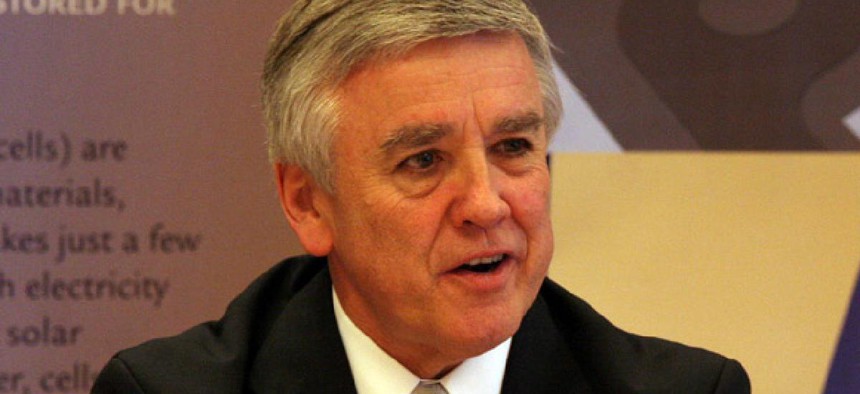
Flickr user us-mission
NOAA takes remedial steps after National Weather Service chief’s departure
Jack Hayes’ retirement follows five-month probe of wrongly rerouted funds.
The sudden retirement on Friday of National Weather Service chief Jack Hayes coincided with a set of remedial actions agency superiors took following the mishandling of appropriated funds. The actions include improved training and oversight of budget execution and better communication with Congress.
Hayes, a six-year veteran atop NWS with 30 years of experience in meteorology as well as service in the Air Force, wrote a goodbye note to staff without referencing a May 24 memo from his boss, National Oceanic and Atmospheric Administration chief Jane Lubchenco. The memo recapped events that led to an internal probe of misrouted funds and set in motion a dozen management changes.
The investigation, undertaken by NOAA and Commerce Department leadership in coordination with the department’s Office of Inspector General, found that National Weather Service employees reprogrammed funds without congressional notification as required by law, a NOAA spokesman said in a statement.
“The investigation also found that no funds were used on inappropriate items, they were simply used in different categories than originally budgeted. The investigation found no evidence of corruption or personal financial gain in these actions. We do not believe any money was moved out of the National Weather Service,” the statement said.
“As NOAA and department leadership say clearly, however, the employees who engaged in these fund transfers violated appropriations procedures and failed to behave according to the professional standards expected of government employees,” the statement added.
Neither the Lubchenco memo nor an accompanying memo from Deputy Commerce Secretary Rebecca Blank mentioned Hayes, though the NOAA chief wrote, “the investigative team did identify personnel-related issues; NOAA is addressing those issues separately and concurrently.”
Both memos, however, referred to a breakdown in the system and faulted multiple parties, saying NOAA headquarters, the Commerce Department’s Office of the Inspector General, and Commerce’s Office of the Chief Financial Officer “all bear responsibility for missing and mishandling early complaints about the questionable financial transactions,” Lubchenco wrote.
The story’s roots date to 2010, when NOAA executives began receiving anonymous complaints via the agency hot line. In July 2011, the administrator’s office investigated one such complaint and shared the results with Blank in late November 2011.
The following month, the two set up an internal investigative team consisting of NOAA senior executives and staff from the Commerce budget office, with the inspector general looped in to “actively engage in this effort.” After conducting 30 interviews with 20 employees, the team produced a 60-page report in May that included 88 exhibits detailing the misrouting of funds.
The conclusions were “disturbing” to Sen. Olympia Snowe, R-Maine, ranking member of the Oceans, Atmosphere, Fisheries and Coast Guard Subcommittee of the Senate Commerce, Science and Transportation Committee, who said there were many remaining questions. “I am further alarmed that the investigative report raises fundamental concerns that the core operations of the National Weather Service are underfunded and that the current process in the Department of Commerce is broken, as it ‘did not encourage questioning or provide independent channels for reporting dubious budget decisions,’ ” she said in a statement.
Snowe on Friday said she is writing to the appropriations panel to urge it to postpone consideration of the fiscal 2013 Commerce spending bill until Congress can review a new request by NOAA for reprogramming funds and “also undertake concrete steps to ensure our federal budget process is transparent, subject to rigorous debate, and ultimately prioritizing the safety and well-being of the American people who rely on accurate and timely information from the National Weather Service.”
NOAA and Commerce leaders presented Congress with proposals to reprogram $26 million in the budget category of local warnings and forecasts and for an additional $9 million for radar stations. They also would create a better documented and more transparent budget process, an improved process for handling complaints departmentwide and better training for senior executives in appropriations reformulation. In addition, they pledged to immediately brief interested members of Congress on details and commission a full independent audit of fiscal 2010 and 2011 budgeting within NWS.
A spokesman for Ralph Hall, R-Texas, chairman of the House Committee on Science, Space and Technology, said Hall had no comment.
Dan Sobien, president of the National Weather Service Employees Organization, said Hayes “did a lot of good things and was responsible for finding money to upgrade weather forecasting for our national air space, which in turn saved billions of dollars for the economy because it helped reduce flight delays to an all-time low.” That involved consulting airlines and air traffic controllers and then assigning extra forecasters to heavily trafficked airports in New York City, Atlanta and Chicago, Sobien said, to assist with decisions on which runways to close in bad weather. Hayes also helped get extra funding for forecasting water levels of the Mississippi River, he added.
“It is long-held knowledge that NWS had been operating at a structural deficit -- in fact the Obama transition team was briefed on it in 2009,” Sobien said. “It sounds like this came as a surprise, but given there’s been a deficit for over a decade, where did they think the money would come from?”
Asked why the investigation was done by internal offices and not the inspector general, Sobien said, “yes, it seems a little odd. The inspector general could have done it considering that NOAA should have known about it.”
The NOAA spokesman said, “Commerce has turned over the full results of its investigation to the inspector general’s office . . . NOAA and department leadership will continue to work with the inspector general’s office and members of Congress to ensure that processes are put in place to restore proper oversight, that funds are properly reprogrammed and that all individuals responsible for these unauthorized transactions are held accountable.”







